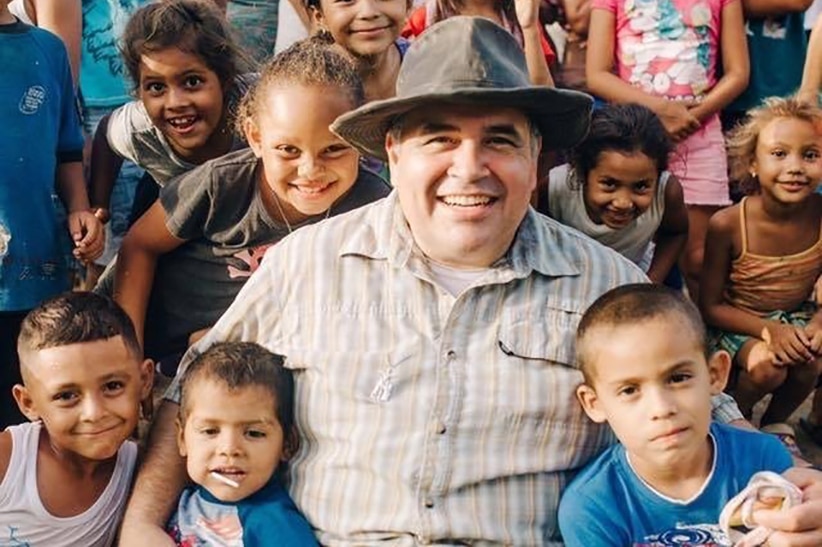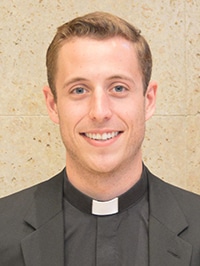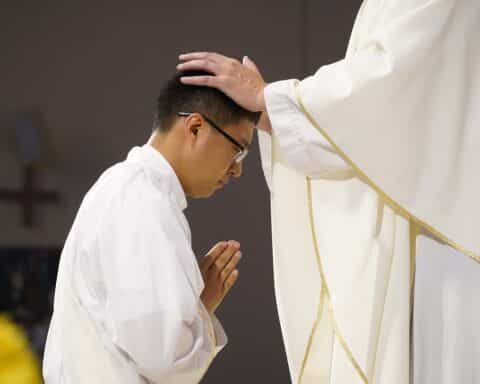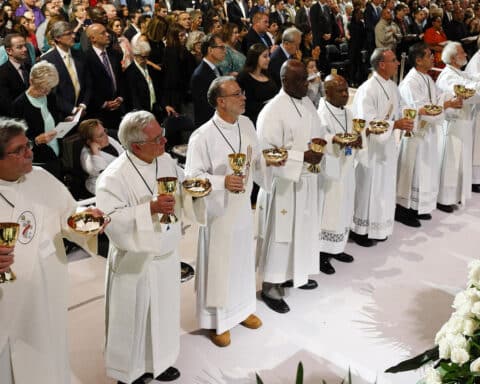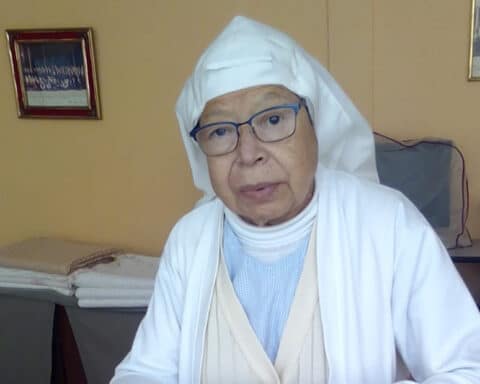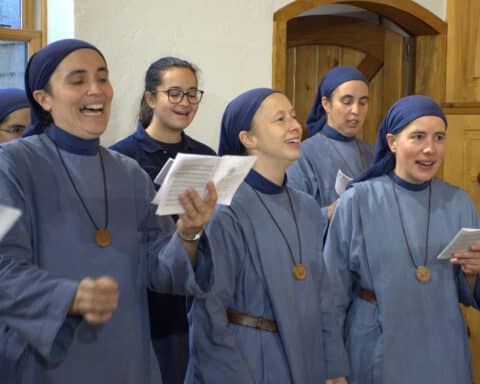According to recent statistics, there are some 36,000 priests, 46,000 men and women religious and 19,000 permanent deacons serving in the United States today.
Each of these links to an impressive history of service to the people of God through their respective vocations. They are the contemporary heirs to a tradition of dedicated men and women dating even to biblical times.
The priesthood
The priesthood was established by Christ through his 12 apostles, upon whom he conferred authority to consecrate bread and wine into his true body and blood in the Eucharist. He further gave them authority to baptize and to forgive sins, and the mandate to “make disciples of all nations” (Mt 28:19).
With Peter as their head, the apostles appointed successors, passing on their authority through the laying on of hands in what would become the Sacrament of Holy Orders. As the young Church grew, a hierarchy of bishops and priests (“presbyters” or “elders” in Scripture) developed inevitably to provide sacraments and apostolic leadership to the ever-expanding Christian community.
Read more vocation articles here.
Through the centuries, every Catholic priest has been ordained by a bishop who traces his authority in an unbroken line to the original apostles — and ultimately to Christ — through apostolic succession, received through holy orders. Priests continue Christ’s ministry by offering his love, mercy and presence through the sacraments he established to serve his faithful until the end of time.
“To minister to the Lord and his people in this way is very humbling, especially as I consider the hundreds of thousands of priests and religious — many of whom are saints — who have gone before us. Their examples inspire me in my own vocation and encourage me to be that example to the men and women of today.”
— Father Matt Wagner
Father Matt Wagner, a priest of the Diocese of Winona-Rochester, Minnesota, who pastors St. Olaf Parish in Mabel and St. Mary in Caledonia, told Our Sunday Visitor he considers it “a privilege as a priest of Jesus Christ to carry on the mission to ‘feed his lambs’ and ‘tend his sheep,'” referring to Christ’s words in John’s Gospel (21:15-17).
“In the Eucharistic sacrifice, in our visits to the sick and the homebound, and in the everyday interactions with those God has placed in our midst, we partake in the work of the master, apart from whom we can do nothing,” said Father Wagner. “I’m humbled to be able to witness firsthand how Christ is still working in this day and age, constantly drawing humanity to himself.”
He said he is “in awe” that God has chosen him to his redemptive work — not only through his baptismal calling but also in his priestly vocation.
“To minister to the Lord and his people in this way is very humbling, especially as I consider the hundreds of thousands of priests and religious — many of whom are saints — who have gone before us,” he said. “Their examples inspire me in my own vocation and encourage me to be that example to the men and women of today.”
The diaconate
The order of deacons appears first in Acts, where the apostles are so occupied caring for the widows and orphans that they don’t have enough time for preaching and teaching. They select seven men as deacons, lay hands on them and assign them to these ministries of service.
Soon, it seems, the deacons are preaching and teaching, too — and doing it so effectively that one deacon, Stephen, becomes the first recorded Christian martyr, stoned by a crowd as Saul, the future St. Paul, looks on approvingly.
Their role became so vital that, already in the second century, St. Ignatius of Antioch writes that deacons “are not servants of food and drink, but ministers of the Church of God” and that, along with priests and bishops, “you cannot have a church without these.”
The diaconate later became one of the “major orders,” a role to which a man would be ordained as a final step before his ordination to the priesthood, and was under the discipline of celibacy in the Roman church. The idea of deacon as a “terminal vocation” faded.
Even today, men are ordained transitional deacons and serve briefly in that capacity before priestly ordination. With the late 1960s, however, came the restoration of a permanent diaconate open to both married and celibate men.
Deacon Rudy Villarreal of the Diocese of Austin, Texas, draws inspiration from the account of the first deacons in Acts (6:1-7).
“As a deacon, I know I am called to serve by way of the Word of God. My love for Christ Jesus, who is the Word Incarnate, motivates me to answer his unmerited sacrificial gift with my service,” Deacon Villarreal told Our Sunday Visitor. “For me, this is a foundational ground.”
His diaconal ministry, he said, begins at home. “Through my experience as husband to my lovely bride, Katrina, and father to my four children, I experience the God who is love. Without love, nothing I do as a deacon — nothing I do as a man — matters.”
Among his joys is the mission-trip program he developed with Friends of Los Niños, a nonprofit based in Plano, Texas. He and Katrina provide formation to participants and then lead trips to Honduras, where they provide education, support, and empowerment to orphans and the poor in several communities.
“My volunteer work with Friends of Los Niños is an excellent example of what it means to be a deacon rooted in the service to widows and orphans,” said Deacon Villarreal. “Living an authentic Christian life as a deacon should be evidenced in your ministry to your family and to all the souls you encounter.”
Consecrated life
The epistles attest to how Christian widows in the early Church dedicated themselves to prayer and good works. In time, they formed small communities. Later came desert hermits and ascetics, who attracted disciples seeking holiness and spiritual direction, generally modeled upon the evangelical counsels of poverty, chastity and obedience.
These communities adopted precepts for their community life, such as the early “rules” written by St. Basil and St. Benedict, and monasteries and convents began to multiply. Vows of consecration became the norm.
By the Middle Ages, in addition to their commitment to prayer and labor, many religious communities were heavily invested in ministries of education, hospitals, caring for the poor and the missions. Religious orders by then had become formalized, requiring charters and papal approval, and members would follow the charisms of their founders.
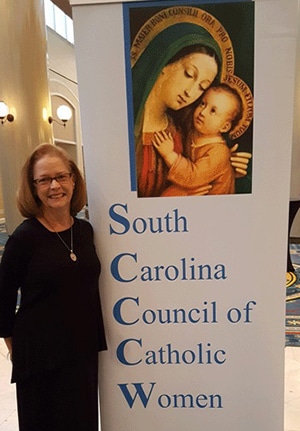
Consecrated life today has countless diverse expressions — active and contemplative, religious and secular, each living the Gospel in radical ways and fulfilling good works and ministries. As the Catechism states, consecrated life “in its various forms is called to signify the very charity of God in the language of our time” (No. 926).
Franciscan Sister Mary Frances Cannon, who converted to Catholicism because of her attraction to the Eucharist, draws inspiration from her order’s namesake.
“St. Francis was convicted that men and women are beings created by God in the image and likeness of God and redeemed through the incarnation of the love of God,” Sister Cannon said. Therefore, “the more human we become, the more Christ-like we become.”
She cites another Franciscan sister, St. Marianne Cope, who provided care to the lepers on the Hawaiian island of Molokai in the late 1800s. “Her life of following in the footprints of Jesus has been an inspiration to many, including myself,” she said.
Now an elementary religion teacher in the Diocese of Charleston, South Carolina, Sister Cannon spoke of the “privilege” to serve in various ministries in the course of her vocation — including parish pastoral associate, caring for street people and the homeless, visiting those in prison, taking the Eucharist to the homebound and hospitalized, and leading Scripture studies.
“God has blessed me with so many wonderful opportunities to serve him by serving my brothers and sisters,” she said. “I love people, especially the poor and most vulnerable. Today, I get to talk about God’s extravagant love all day.”
Gerald Korson writes from Indiana.

